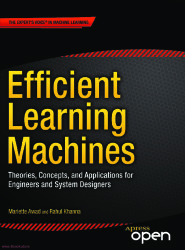Efficient Learning Machines
Machine learning techniques provide cost-effective alternatives to traditional methods for extracting underlying relationships between information and data and for predicting future events by processing existing information to train models. Efficient Learning Machines explores the major topics of machine learning, including knowledge discovery, classifications, genetic algorithms, neural networking, kernel methods, and biologically-inspired techniques. Mariette Awad and Rahul Khanna's synthetic approach weaves together the theoretical exposition, design principles, and practical applications of efficient machine learning. Their experiential emphasis, expressed in their close analysis of sample algorithms throughout the book, aims to equip engineers, students of engineering, and system designers to design and create new and more efficient machine learning systems. Readers of Efficient Learning Machines will learn how to recognize and analyze the problems that machine learning technology can solve for them, how to implement and deploy standard solutions to sample problems, and how to design new systems and solutions. Advances in computing performance, storage, memory, unstructured information retrieval, and cloud computing have coevolved with a new generation of machine learning paradigms and big data analytics, which the authors present in the conceptual context of their traditional precursors. Awad and Khanna explore current developments in the deep learning techniques of deep neural networks, hierarchical temporal memory, and cortical algorithms. Nature suggests sophisticated learning techniques that deploy simple rules to generate highly intelligent and organized behaviors with adaptive, evolutionary, and distributed properties. The authors examine the most popular biologically-inspired algorithms, together with a sample application to distributed datacenter management. They also discuss machine learning techniques for addressing problems of multi-objective optimization in which solutions in real-world systems are constrained and evaluated based on how well they perform with respect to multiple objectives in aggregate. Two chapters on support vector machines and their extensions focus on recent improvements to the classification and regression techniques at the core of machine learning.
Download free tutorial in PDF (268 pages) created by Mariette Awad .
| Pages : | 268 |
| Size : | |
| File type : | |
| Downloads: | 107 |
| Created: | 2021-05-15 |
| License: | Free |
| Author(s): | Mariette Awad |

Warning: Trying to access array offset on false in /home/tutovnfz/public_html/article.php on line 233
Others Learning Machines Tutorials
Others related eBooks about Efficient Learning Machines
Retro Gaming with Raspberry PiThis book shows you how to set up a Raspberry Pi to play classic games, and a whole lot mo..., download free Raspberry Pi tutorial in PDF (164 pages) created by Bob Clagett ....
Internet of Things (IoT) in 5 Days: an easy guide to Wireless Sensor Networks (WSN), IPv6, and IoTThis booklet is a quick but thoughtful guide to jump into the Internet of Things (IoT), covering important subjects as IPv6 networking, sensors, wireless protocols and technologies, as well as IoT cloud platforms and its most commonly used protocols, featuring lots of hands-on examples to start work...
MATLAB tutorial for professionalsDownload free MATLAB tutorial course in PDF, training file in 33 chapters and 182 pages. Free unaffiliated ebook created from Stack OverFlow contributor....
Computer Science Tapestry: Exploring Programming and Computer Science with C++This book is designed for a first course1 in computer science that uses C++ as the language by which programming is studied. My goal in writing the book has not been to cover the syntax of a large language like C++, but to leverage the best features of the language using sound practices of prog...
DevOps in PracticeDownload free course DevOps in Practice, pdf file on 36 pages by J. Paul Reed....
Learn Azure in a Month of LunchesDownload free course Learn Azure in a Month of Lunches, pdf file on 370 pages by Iain Foulds....
Docker for DevelopersDownload free course Docker for Developers, pdf file on 153 pages by Rafael Gomes....
The SysAdmin HandbookDownload free course The SysAdmin Handbook, pdf file on 514 pages by Various....
Tutorial Eclipse IDEDownload free Eclipse tutorial course in PDF, training file in 9 chapters and 32 pages. Free unaffiliated ebook created from Stack OverFlow contributor....
Sensor TechnologiesDownload free course Sensor Technologies, pdf file on 321 pages by Michael J. McGrath, Cliodhna Ní Scanaill....